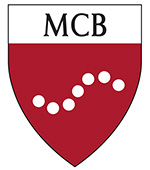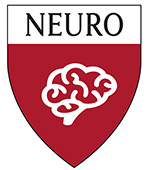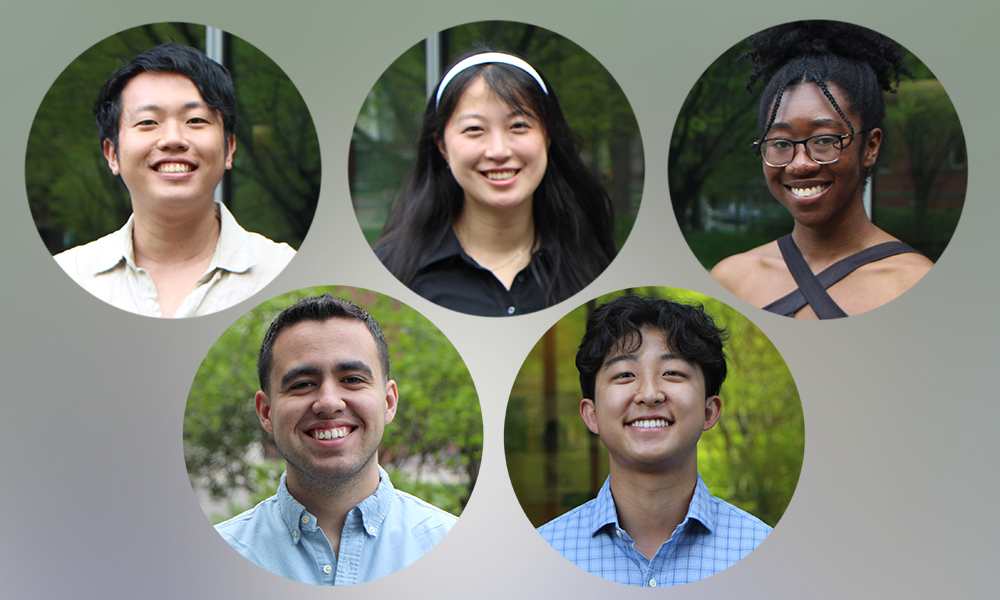Five seniors in MCB, CPB, and Neuro have been awarded prestigious prizes for their thesis work. Neuroscience concentrator Daniel Kwon, MCB and Computer Science concentrator Michelle Lu, and MCB concentrator Tomi Siyanbade were recognized by the university-wide Hoopes Prize. The Hoopes celebrates excellence in undergraduate research and thesis projects across all disciplines. Meanwhile, CPB concentrator Jorge Guerra and MCB concentrator Brandon Kwon received the Henderson Prize from the Board of Tutors in Biochemical Sciences. Founded in 1926, the Board of Tutors organizes tutorials and mentoring opportunities for students in MCB and CPB. The Board of Tutors’ membership includes several MCB faculty and prominent researchers in cellular biology and biochemistry.
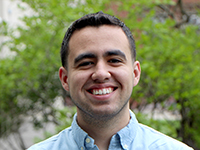
Jorge Guerra (CPB with Secondary in Statistics)
Jorge Guerra conducted his thesis research in the Gaudet Lab. He looked into the structures of metal-transporting proteins called Nramps in the bacteria Eggerthella lenta. “Natural resistance-associated macrophage proteins (Nramps) help cells maintain homeostasis by transporting essential transition metal cations, such as iron and manganese, into the cell,” Guerra explains. “These proteins achieve this using a highly-conserved metal-binding-site motif consisting of aspartate, asparagine, and methionine residues.” Eggerthella lenta’s Nramp-like proteins contain an evolutionary divergent binding site motif, which led Guerra to wonder if these sites changed how the protein interacts with metals. “To answer this question, I used X-ray crystallography to determine the structure of an Nramp-like protein in E. lenta and compare it to the structure of canonical Nramps,” he says. “I also conducted in vitro proteoliposome-based transport assays to test the metal selectivity of this Nramp-like protein.” Guerra found that mutations in the binding sites did, in fact, alter metal transport by the Nramp-like protein. These results could shed light on how the bacteria uses its Nramp-like proteins to maintain a healthy state.
Guerra is motivated by science’s potential to save lives and bolster human health. “During my freshman year at Harvard, I became interested in learning how scientists leverage their understanding of protein structure and function to discover and design therapeutics that save lives,” he says. “I saw this project as a perfect opportunity to explore interesting questions and begin building a strong foundation in structural biology.”
Receiving the Henderson Prize is an honor, Guerra says. “I have no doubt that this will motivate me to continue putting my heart into my work as a scientist.”
He adds that he is grateful to his support system. “First, I would like to thank Dr. Rachelle Gaudet and Dr. Shamayeeta Ray. I could not have asked for better mentors,” he says. “Their mentorship has been instrumental to my development as a scientist, and I am grateful I had the opportunity to work alongside them. I would also like to thank the rest of the Gaudet Lab for creating such an enjoyable work environment, and for lending a helping hand when I needed one. Lastly, I would like to thank my family for their unwavering love and support.”
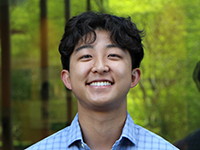
Brandon Kwon (MCB with a Secondary in Global Health & Health Policy)
MCB concentrator Brandon Kwon says that receiving the Henderson Prize was a “huge, unexpected surprise.”
Kwon conducted his research in Alessandro Alessandrini’s lab at MGH, which specializes in immune response to organ transplants. “My initial interest in transplant immunology began with a conversation I had with an elderly Spanish-speaking couple while volunteering at St. Jude Hospital in high school,” Kwon says. “I was helping at the rehabilitation facility when a simple request for water turned into a conversation about their son’s struggle to save his failing kidney. They expressed their dismay over the long transplant waitlist, and I could sense their growing hopelessness. The husband lamented, “¿Por qué es tan difícil? La vida es más importante.” (Why is it so difficult? Life is the most important.) This encounter made me reflect on the organ shortage crisis and inspired me to contribute to research aimed at improving the transplant process so that these limited resources aren’t wasted and patients don’t continue to struggle post-surgery.”
In his thesis work, Kwon studied B cells, which are known for producing antibodies that neutralize pathogens and for playing a regulatory role in reining in the immune system. He wanted to find out if the B cells go through a transition from contributing to transplant rejection to a regulatory state that stops the attacking immune cells. To find out, he performed single cell RNA-sequencing and flow cytometric analyses to catalog cells expressing particular genes. “From these experiments, I observed a temporal shift toward B cells expressing Siglec-G and FcγR2b, both markers indicative of a regulatory phenotype,” Kwon explains. In further experiments, he knocked out the gene FcγR2b, and all of the mice died after their transplant surgeries. Kwon concludes that the gene plays an important role in shifting the immune system from an attacking state to a regulatory tolerance state.
Kwon expressed appreciation for a number of academics who have helped him during his undergraduate journey. “First and foremost, I’m deeply grateful to my principal investigator, Dr. Alessandro Alessandrini, who took me under his wing as an inexperienced freshman and patiently guided me in my academic endeavors,” he says. “I also want to thank Ed Szuter for his mentorship, from training me in lab techniques to supporting my summer projects. Additionally, I extend my gratitude to Dr. Takahiro Yokose for his assistance with my projects, ranging from performing mouse surgeries to teaching me RStudio data analysis. On campus, my thanks go to Dr. Dominic Mao and Dr. Monique Brewster for their support within the Molecular and Cellular Biology department, making sure I was always on track and providing help whenever needed.”
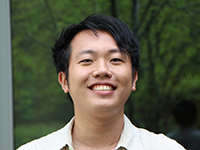
Daniel Kwon (Neuro, MBB)
Neuroscience concentrator Daniel Kwon was honored with a Hoopes Prize for research he conducted in Evan Macosko’s lab at the Broad Institute. He focused on a gene called XPO7. Previous studies have suggested that XPO7 is a risk factor for schizophrenia. Kwon wanted to know whether mutations in XPO7 alter stress response.
“To investigate, I studied mouse models with XPO7 mutations, focusing on how they respond to stress, a known environmental factor that exacerbates schizophrenia symptoms,” Kwon explains. “To observe biological differences, I measured their corticosterone, a stress hormone, levels. For behavioral differences, I captured depth recordings of their behavior and analyzed them with unsupervised machine learning algorithms to identify sub-second behaviors that differ between genotype and condition.”
He found that mice with broken XPO7 proteins had slower response times and exhibited fewer adaptations to stress. Their corticosterone response also appeared blunted. These findings indicate that XPO7 may regulate stress responses through the hypothalamic-pituitary-adrenal (HPA) axis.
Doing behavioral experiments with mice proved to be a challenge, as mice are nocturnal. Kwon had to work around the animals’ schedules, sometimes spending all night in the lab and only leaving at dawn. “Grappling with the interpretation of my data posed an additional hurdle,” he adds. “Notably, the absence of prior literature linking the cellular and molecular functions of XPO7 with schizophrenia compounded the challenge. This lack of established groundwork necessitated a comprehensive exploration and analysis of the data, requiring innovative approaches to discern meaningful patterns and correlations within the findings.”
“I feel immensely grateful to receive the Hoopes Prize and be recognized for the culmination of my undergraduate thesis work,” Kwon adds. “This recognition serves as a reminder of the invaluable support and guidance I received along the way.” He expressed gratitude to his PI Evan Macosko, his postdoctoral mentor Alyssa Lawler, and his family and friends.
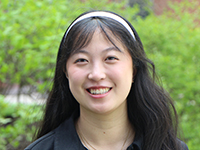
Michelle Lu (MCB-Computer Science)
For her Hoopes-winning thesis, MCB concentrator Michelle Lu developed a computational platform that opens up new applications for nanopore sequencing. “Nanopore sequencing is a fourth-generation sequencing technology that has only become practically feasible for tRNAs in the past year,” Lu explains. “The cost and time efficiency of tRNA nanopore sequencing would be improved by the ability to sequence multiple samples simultaneously, and then computationally separate the data from each sample.” Her project focused on the separation of data or “demultiplexing.”
She applied her computational tool to the sequencing of tRNAs, or transfer RNAs, which are shorter RNAs that serve as links between the messenger RNA and the growing chain of amino acids during protein synthesis. Using a barcode system of unique genetic sequences, she was able to analyze modifications to tRNAs.
When Lu’s “demultiplexer” is released, it will be the first such computer program for tRNA nanopore sequencing.
Lu sees her thesis as a capstone to her joint concentration in MCB and computer science. “This was certainly the first time in my life that I have tackled a project of this scope and timescale,” she says. “Any long scientific project is bound to be riddled with unexpected roadblocks – experimental equipment that breaks and needs to be replaced, a computational platform that takes over a month of fiddling with package dependencies to be able to install, etc. These hurdles challenged me to be agile in my long-term planning, one of the most valuable skills I’ve improved during my thesis.”
Lu adds, “I truly have so many people I’d like to thank. My research advisors, Prof. George Church and Dr. Russel Vincent, as well as all members of the Church Lab. My MCB advisors and tutor – Monique, Dominic, and Prof. Léger-Abraham. My advisors in the CS department. And of course, my friends and family. Thank you all for making this thesis possible!”
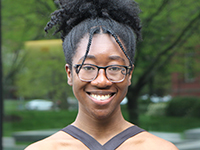
Tomi Siyanbade (MCB with a Secondary in Global Health and Health Policy and a Language Citation in French)
MCB concentrator Tomi Siyanbade teamed with the Sabeti Lab to pursue a project with real-world ramifications. “My thesis focuses on developing accessible (which I defined as low-cost, user-friendly, and implementable in low-resource settings) and accurate diagnostic tests to detect Lassa Fever, a serious viral disease found across West Africa,” she says. “I was primarily concerned with accuracy and accessibility to the target end-users: the community health professionals at the front lines of outbreaks.”
“I wanted to work on something with a tangible impact in the next 1-2 years rather than 10-20,” she adds. “The impact-driven nature of the Sabeti lab was one of its key draws to me, and I wanted to participate in a thesis project that could ultimately benefit real people and wouldn’t just end once I left. Personally, I also realized that diagnostics are one of the most impactful tools for improving human health, and as a Nigerian, I was aware of the immense burden that Lassa posed to health.”
To address the Lassa Fever diagnostic gap, Siyanbade developed a CRISPR-based test that could recognize key sequences from the viral genome. The final test reads out on a strip of paper, similar to how over-the-counter COVID tests do.
“It was ultimately challenging to assess my test’s accuracy and clinical significance,” Siyanbade says. “The initial literary review, as well as the final test validation, was difficult with the relative deficit incomparable Lassa diagnostics that are approved in the world today, coupled with my lack of access to sequences for such a potentially dangerous pathogen. Overall, this made it more difficult not to “move the goalpost” and collect data that could convince me of the test’s true potential impact in the field.”
Siyanbade adds that she is glad to receive the Hoopes Prize and grateful to everyone who has helped her throughout her thesis journey.
Congratulations to these Hoopes and Henderson Prize winners!



